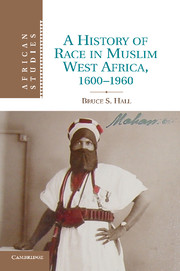Book contents
- Frontmatter
- Contents
- List of maps and figures
- Acknowledgments
- Note on orthography
- Abbreviations used in references
- Glossary
- Introduction
- PART ONE Race Along The Desert Edge, C. 1600–1900
- PART TWO Race And The Colonial Encounter, C. 1830–1936
- 3 Meeting the Tuareg
- 4 Colonial Conquest and Statecraft in the Niger Bend, c. 1893–1936
- PART THREE The Morality of Descent, C. 1893–1940
- PART FOUR Race and Decolonization, C. 1940–1960
- Conclusion
- Index
- Misc-endmatter
- References
4 - Colonial Conquest and Statecraft in the Niger Bend, c. 1893–1936
Published online by Cambridge University Press: 05 August 2011
- Frontmatter
- Contents
- List of maps and figures
- Acknowledgments
- Note on orthography
- Abbreviations used in references
- Glossary
- Introduction
- PART ONE Race Along The Desert Edge, C. 1600–1900
- PART TWO Race And The Colonial Encounter, C. 1830–1936
- 3 Meeting the Tuareg
- 4 Colonial Conquest and Statecraft in the Niger Bend, c. 1893–1936
- PART THREE The Morality of Descent, C. 1893–1940
- PART FOUR Race and Decolonization, C. 1940–1960
- Conclusion
- Index
- Misc-endmatter
- References
Summary
A TUAREG MENACE?
In West Africa, the colonial encounter with the Tuareg began in the 1890s. It involved a series of battles, military reconnaissance missions, and meetings that all had the intention of forcing different Tuareg groups to submit to the new reality of French authority over the Niger Bend and the southern and central Sahara. Because a bifurcated French image of the Tuareg had already been created and popularized by the 1870s – one which ranged from the admirable errant knights of the desert on the one hand to the wild and dangerous marauders on the other hand – French officers approached the Niger Bend with hope tempered by trepidation. Those involved in reconnaissance missions, such as Georges Toutée or the Lieutenant de vaisseau Hourst, tended to be more hopeful about the possibilities of French-Tuareg understanding. Those engaged directly in fighting the Tuareg were more likely to emphasize what they thought of as the wild and natural predilection to violence that could be identified in the Tuareg character. Louis Frèrejean, a junior officer who participated in the conquest of Timbuktu, wrote in his journal that the French mission was justified squarely in terms of eliminating the Tuareg menace: “[W]e must remove from Timbuktu the brutal domination of the Tuareg, who are the tyrannical, bullying and extortionist masters of the inhabitants, living on the backs of their clients.”
- Type
- Chapter
- Information
- A History of Race in Muslim West Africa, 1600–1960 , pp. 130 - 172Publisher: Cambridge University PressPrint publication year: 2011



